Iraqi Blood Is on All of Our Hands
In a span of weeks, security forces have killed 100-plus protesters and injured thousands more—the grim legacy of Operation Iraqi Freedom.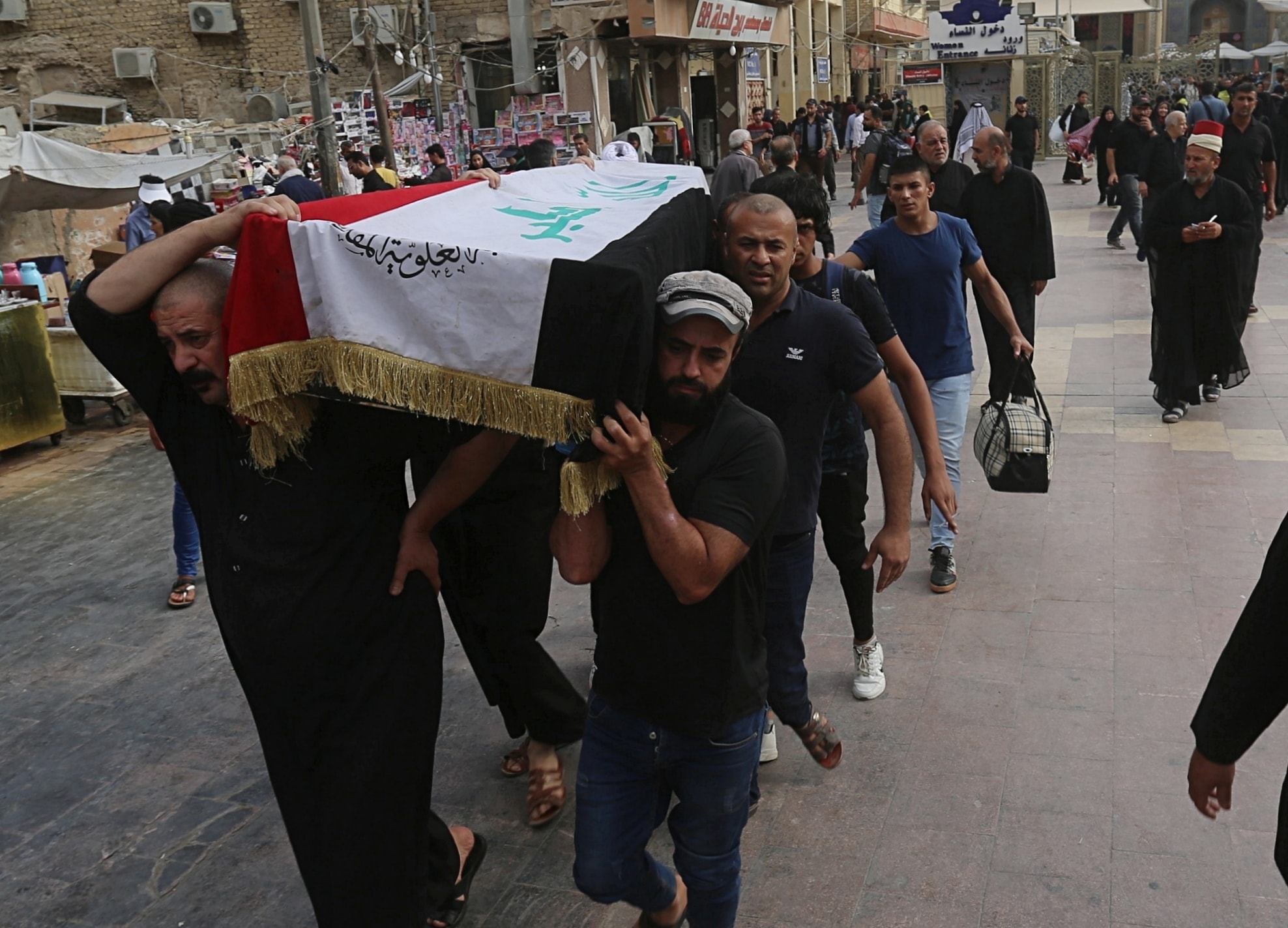 Mourners carry the flag-draped coffin of Hassan Radi, a protester killed during anti-government demonstrations in Najaf, Iraq, this week. (Anmar Khalil / AP)
Mourners carry the flag-draped coffin of Hassan Radi, a protester killed during anti-government demonstrations in Najaf, Iraq, this week. (Anmar Khalil / AP)
In a rather macabre instance of déjà vu, Iraq is again coming apart at the seams. Iraqi security forces have killed more than 100 mostly peaceful protestors over the last few weeks, wounding thousands more. And that’s just what the military acknowledges. In daily demonstrations across Baghdad and southern Iraq, protesters have railed against unemployment, poor social services, and government graft and corruption—specifically the theft of hundreds of millions in tax dollars and national oil wealth. At the moment, it’s unclear whether the prime minister will resign, the security forces will double-down on their brutality, or, as some people have begun to demand, a new military ruler will take charge. Whatever the future brings, things are unlikely to end well.
Few Americans have noticed, of course, what with the media circus surrounding Donald Trump’s impeachment and a spate of recent leaks airing his “dirty laundry.” News treated as entertainment by design serves to distract, breeds apathy and engenders consent. This system works in the interests of the elites, enabling an unelected national security state to design foreign policy—and initiate wars—as it pleases. But it also obviates Washington, and we the people, of any responsibility or remorse for the destruction of distant societies. The browner and more Islamic the population of such societies, the less we can be bothered. American racism paired with lethargy and ignorance dooms foreigners the world over.
As a veteran of the second Iraq war serving during the bad old days of 2006-07 in Baghdad, and as an avid student of Iraqi history, I vaguely sense what so few Americans do: that I’ve seen this movie before. Though few policy analysts, or even historians, frame it as such, the United States has treated Iraq like an old-school colony for going on 40 years now, characterized by varying degrees of treachery, betrayal, invasion and violent demolition. The results have been remarkably cyclical. Seen in this light, the latest crackdown on protesters aligns almost perfectly with the harrowing legacy of American interventionism in Mesopotamia.
Washington didn’t care much for Iraq until the Iranian Revolution of 1979 resulted in the overthrow of the venal, U.S.-backed Shah. Iraq had previously experienced coups, dictatorships and the fascist rule of Saddam Hussein’s Baath Party. All of that was fine with Washington as long as the country didn’t dabble in Islamism or veer too far into the Soviets’ orbit. President Ronald Reagan backed Saddam’s brutal dictatorship and sanctioned his aggressive invasion of Iran, the eight-year war that followed resulting in the deaths of half a million Iraqis. Reagan even sold supplies to Iraq and helped Saddam pick out targets—first Iranian troops and then his own Kurdish minority—to bomb with poison gas. Thousands died horrendous deaths.
Then, when the inevitable “blowback” blew, and Saddam threatened Western oil supplies by invading neighboring Kuwait, President George H.W. Bush instantly turned on Iraq. U.S. air and armored power decimated an outmatched Iraqi Army, then American planes bombarded fleeing Iraqi troops on what became known as the “Highway of Death” after the conflict’s outcome already had been decided. One U.S. commander labeled the routed Iraqis “sitting ducks,” and thousands were slaughtered. Some American pilots even felt a pang of conscience during the bombing, with one opining that “One side of me says, ‘That’s right, it’s like shooting ducks in a pond.’ Does that make me uncomfortable? Not necessarily. Except there is a side of me that says, ‘What are they dying for? For a madman’s cause? And is that fair?’ Well, we’re at war; it’s the tragedy of war, but we do our jobs.”
After a ceasefire was negotiated, the top American commander in the region made the unauthorized decision to allow Saddam to keep flying his Soviet-supplied attack helicopters. Soon after, Bush I encouraged oppressed Iraqi Shia and Kurds—Saddam’s regime was majority Sunni—to rebel and overthrow the dictator. They tried, naively expecting American military support. Washington sold them out; tens of thousands were mowed down, many by those same helicopters. Perhaps, then, it should have come as little surprise that not all Iraqis, Shia included, welcomed the illegal, ill-advised and immoral 2003 invasion with the “flowers and smiles” the Bush II administration had promised.
The U.S. military and its incompetent neoconservative masters destroyed Iraqi society within months. Saddam’s military was disbanded, putting some half million people out of work. Tens of thousands of nominal Baath Party members lost their government jobs (and pensions), and libertarian capitalist experimentation—a “shock therapy” of sorts—bankrupted the already shaky Iraqi economy. This led to a bloody anti-American insurgency and then a horrific sectarian civil war, shattering what little remained of Iraqi society. Somewhere between 150,000 and 500,000 civilians died. Who had the time to accurately count?
Even though top generals and the secretary of defense lied to Iraqis, U.S. troops and the American public when they falsely claimed there was no civil war—it took Chelsea Manning’s heroic Wikileaks revelations to blow the lid on that—they (and we soldiers) knew the score. So in order to proclaim victory and exit stage left, Bush announced a new troop “surge” to tamp down the violence.
The whole charade was billed as a temporary escalation to create the space for an Iraqi political settlement among different sects and ethnicities. That never happened, of course. Trust me, I was there. What did happen was an “enlightened” Gen. David Petraeus sold Congress and the public the lie that his walling off of neighborhoods and pay offing of former insurgents in a new Sunni militia—both temporary and short-sighted measures—was some kind of triumph.
When Obama assumed office, he accepted that myth despite previously opposing the surge and eventually withdrew U.S. forces. Left behind was a corrupt, sectarian and largely illegitimate Shia government. In a disturbing prelude to today’s demonstrations, Sunnis and other desperate Iraqis protested the Baghdad regime; U.S.-trained security forces gunned them down by the hundreds. Veterans of that protest movement and the by-then-unpaid Petraeus militiamen soon joined forces with a reemerging Al Qaeda offshoot that eventually billed itself as the Islamic State.
The rest is blood-splattered history. ISIS conquered most of northern and western Iraq, the nation’s army collapsed and thousands more died in the latest manifestation of its rolling civil war. Soon enough, the U.S. military and its plethora of aircraft were back in Iraq, bombing and shelling their way to a new “victory” over the Islamic State. In the penultimate battle for Iraq’s second city, Mosul, American commanders downplayed civilian casualties, but outside sources estimated deaths neared 9,000—10 times what the U.S. military would recognize. American troops are still there in modest numbers, while the current Iraqi government has failed to address the corruption and graft that helped fuel ISIS in the first place. Washington, meanwhile, remains mostly silent.
That’s just a brief telling of modern Iraqi history and the nefarious role of the U.S. in this great national cataclysm. Nonetheless, when viewing the protests and the suppression in Iraq today, that context ought to be instructive. No matter how much average Americans wish it were so, none of today’s violence unfolds in a vacuum; and it is America’s problem.
Permit me a gloomy prediction. When Iraqi civil society once again collapses—and it will—the legacy of Operation Iraqi Freedom (2003) and Uncle Sam’s military adventurism will continue to haunt America. Nevertheless, as long as significant numbers of U.S. troops aren’t dying on the streets of Baghdad or Baquba, corporate media will ignore the story and precious few citizens will connect the dots. No, America isn’t solely responsible for Iraqi misgovernment or suffering—the locals have troubled agency all their own—but it sure has stirred the historical pot and set many of the conditions for state collapse.
Americans bear many sins in this country’s crusading wars for the Greater Middle East. Still, in its degree of horror and lasting legacy, the destruction of Iraq must rank as the gold standard of Neo-imperial iniquity. The blood of more than 100 recent protesters, hundreds of thousands of earlier civil war victims and who knows how many future martyrs, are on all of our hands
————
Danny Sjursen is a retired U.S. Army major and a regular contributor to Truthdig. His work has also appeared in Harper’s, The L.A. Times, The Nation, Tom Dispatch, The Huffington Post, and The Hill. He served combat tours with reconnaissance units in Iraq and Afghanistan and later taught history at his alma mater, West Point. He is the author of a memoir and critical analysis of the Iraq War, “Ghostriders of Baghdad: Soldiers, Civilians, and the Myth of the Surge.” He co-hosts the progressive veterans’ podcast “Fortress on a Hill.” Follow him on Twitter at @SkepticalVet.
Your support matters…Independent journalism is under threat and overshadowed by heavily funded mainstream media.
You can help level the playing field. Become a member.
Your tax-deductible contribution keeps us digging beneath the headlines to give you thought-provoking, investigative reporting and analysis that unearths what's really happening- without compromise.
Give today to support our courageous, independent journalists.
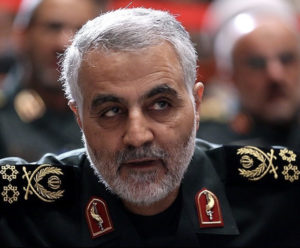

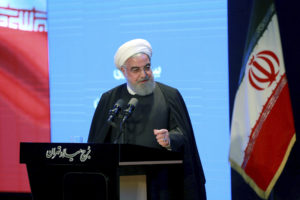

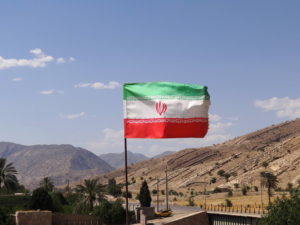
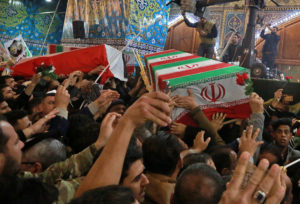
You need to be a supporter to comment.
There are currently no responses to this article.
Be the first to respond.